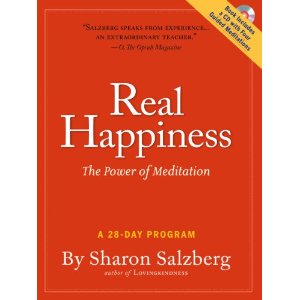 |
 |
Real Happiness and Meditation Buddha Nature < back to Real Happiness and Meditation
I went to Dharamsala, India in 1990 for a Mind and Life conference with the Dalai Lama. It was a small gathering of psychologists, scientists and meditators, exploring the topic of healing emotions. "What do you think about self-hatred?" I asked when it was my turn to bring up an issue for discussion. I was eager to get directly to the suffering I'd seen so often in my students, a suffering I was familiar with myself. The room went quiet as all of us awaited the answer of the Dalai Lama. Looking startled, he turned to his translator and asked pointedly in Tibetan again and again for an explanation. Finally, looking back at me, the Dalai Lama tilted his head, his eyes narrowed in confusion. "Self-hatred?" he repeated in English, as though trying out the words. "What is that?"
I think that encapsulates much of what we encounter as the teachings come from East to West. I don't want to deify Asian culture, but the rock bottom belief that if we went to the core of our being, if we really knew who we were it would be pretty bad news, doesn't seem to be there, certainly not in the way it exists in the West.
During the remainder of the session, the Dalai Lama repeatedly attempted to explore the contours of self-hatred with us. "Is that some kind of nervous disorder?" "Are people like that very violent?" "But you have Buddha nature. How could you think of yourself that way?" At the end he said, "I thought I had a very good acquaintance with the mind, but now I feel quite ignorant. I find this very, very strange."
For me, one of the most fascinating aspects of this session took place during our tea break. Several of the Westerners who were old students of the Dalai Lama's tried to convey some of how the teachings of the Buddha could sound if one was listening with the perspective of self doubt and chronic self condemnation instead of confidence in our Buddha nature, however obscured it might be. They related things like, "When I first heard, ‘Give up self-cherishing, this is what I heard…'" "All this emphasis on effort, when I secretly think I might not be capable of achievement, makes me feel…"
It was amazing. The fact that self-hatred was not a part of his worldview summed up the essence of what I first aspired to through the practice of meditation. And I've certainly witnessed in many years of teaching the burden that not really believing we deserve to be happy, not really feeling that we can actually achieve happiness, brings.
In the Theravada tradition when we do lovingkindness meditation, the instruction is to begin by offering lovingkindness to ourselves. The explanation is that this is easiest, that we can "search the entire universe for someone who is more deserving of our love and affection than ourselves and that we won't find that person anywhere. We ourselves deserve our own love and affection more than anyone." But for many, that's not the easiest, by any stretch. It might in fact be the hardest. And so we need a creative approach to accommodate that.
We're taught (and I teach) that lovingkindness for ourselves is a foundation for lovingkindness for others, so that our motivation in giving is generosity and not martyrdom, our efforts at morality are not guilty and repressive but claiming a slice of the great human compassionate potential as our own. We're taught (and I teach) that our own happiness, when it goes beyond merely seeking pleasure and avoiding pain, is not born of the circumstance we find ourselves in. Instead, when it is real and stable happiness, it is the basis for our ability to be generous, kind, and compassionate. Not only do we deserve it, we need that kind of happiness.
Implied in all of this is a deep sense of our own worth. What I've seen over these years of bringing an Asian teaching to the West, is that this sense needs to be a lot more than implied: it needs to be stated, examined, and nourished; our fears, assumptions and hesitations need to be challenged; and our capacity for freedom and happiness needs to be continuously brought forth and celebrated.
< back
to Real Happiness & Meditation
Sharon's latest book is Real Happiness: The Power of Meditation: A 28-Day Program, published by Workman Publishing. She is also the author of The Kindness Handbook and The Force of Kindness, both published by Sounds True; Faith: Trusting Your Own Deepest Experience, published by Riverhead Books; Lovingkindness: The Revolutionary Art of Happiness and A Heart as Wide as the World, both published by Shambhala Publications; and co-author with Joseph Goldstein of Insight Meditation, a Step-by-Step Course on How to Meditate (audio), from Sounds True. She has edited Voices of Insight, an anthology of writings by vipassana teachers in the West, also published by Shambhala.
Sharon Salzberg is cofounder of the Insight Meditation Society (IMS) in Barre, Massachusetts. She has played a crucial role in bringing Asian meditation practices to the West. The ancient Buddhist practices of vipassana (mindfulness) and metta (lovingkindness) are the foundations of her work. "Each of us has a genuine capacity for love, forgiveness, wisdom and compassion. Meditation awakens these qualities so that we can discover for ourselves the unique happiness that is our birthright." For more information about Sharon, please visit: www.SharonSalzberg.com.
< back
to Real Happiness and Meditation |
|||
Home | About Us | Features | Ask
Our Team | Inspiration
& Practice | Women of Vision | Resources
Copyright 2011 Feminist.com. All rights reserved.

